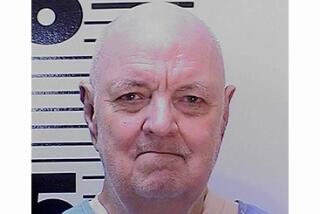7 Years and 2 Trials Later, Case Is Closed : Courts: A convicted drunk driver is sentenced to 11 years in state prison for vehicular manslaughter in the deaths of a mother and her three sons in Fullerton.
- Share via
SANTA ANA — Ending almost seven years of legal maneuvers that included two jury trials, a convicted drunk driver who killed a mother and her three children was sentenced Monday to 11 years in state prison for vehicular manslaughter.
However, Michael W. Reding, 33, who has already served more than five years in prison on a second-degree murder conviction in the case, should be free on parole in less than a year, his attorney said.
“I believe you are remorseful,” Superior Court Judge Dennis S. Choate told Reding before imposing the sentence, the maximum for vehicular manslaughter.
“When you get out, it’s your choice how you go about putting this behind you,” Choate continued, adding that Reding “did not intend to run down a family. He intended to drink.”
The sentencing capped a long legal battle that followed the Oct. 23, 1984, traffic accident in which Pamela Trueblood, 36, and her sons Eric, 11, Kerry, 9, and Scott, 8, were killed.
Trueblood and her children were driving on State College Boulevard near Bastanchury Road in Fullerton when Reding lost control of his car, crossed the center divider and smashed head-on into Trueblood’s car.
It was later determined that Reding’s blood-alcohol level was slightly above the then-legal limit of 0.10%. The limit has since been lowered to 0.08%.
In his first trial, which ended in September, 1986, Reding was convicted of four counts of second-degree murder, the only such conviction involving a drunk-driving case ever in Orange County.
During that trial, the defense accused the prosecution of using Reding as a harsh example.
Reding was sentenced to 15 years to life in prison on that conviction and spent time in both Soledad and Chino state prisons.
But the 4th District Court of Appeal later overturned the conviction and suggested that prosecutors agree to accept a guilty plea to vehicular manslaughter. When prosecutors rejected that advice, a new trial was scheduled, and Reding was later transferred back to Orange County Jail for his retrial.
He was convicted last March 11 of the lesser charge of vehicular manslaughter with gross negligence.
Before the sentence was handed down Monday, Robert Trueblood, Pamela’s widower, made an emotional statement to the court, saying he did not agree that the manslaughter conviction was appropriate.
But he stressed that he was not after “a pound of flesh” and urged Reding to join him later in spearheading anti-drunk driving seminars.
“We’ll find out how remorseful he is when he gets out,” Trueblood said.
When asked if he was satisfied with the verdict and sentence, Trueblood replied: “We got as close to justice as this court could give out today. I have to live with it. If I don’t, it will kill me.”
Trueblood, who has since remarried, has fought vigorously against drunk driving since the accident that shattered his personal and professional life.
“I no longer have the wife and children that I did,” he said after the sentencing. “I no longer have the work I did. My concern is that when he comes out, will he deal with problems the same way he did before,” he said, referring to Reding’s drinking. “I believe there’s a good chance he will drink and drive again.”
Reding’s attorney, Michael P. Giannini, told Judge Choate that on the day of the accident, his client was under stress and was depressed. Reding went to Laredo’s bar, drank six beers and several kamikazes, a mixed drink made with vodka, Giannini said.
Reding, a Northrop physicist, was recovering from a previous auto accident; his leg was still in a cast. His girlfriend had just broken up with him and he was forced to work part time at his job because of his leg injury.
“He was feeling tremendous self-doubt socially,” Giannini told Choate. “The defendant was in an extremely confused state. That explains why this moderate person drank too much that night.”
But after sentencing, Giannini stressed that his client, who only drank occasionally, nevertheless attended Alcoholics Anonymous meetings while in prison and had vowed never to drink again.
“He holds himself up to high standards,” Giannini said, “and he has chastised himself over and over again.”
More to Read
Sign up for Essential California
The most important California stories and recommendations in your inbox every morning.
You may occasionally receive promotional content from the Los Angeles Times.













